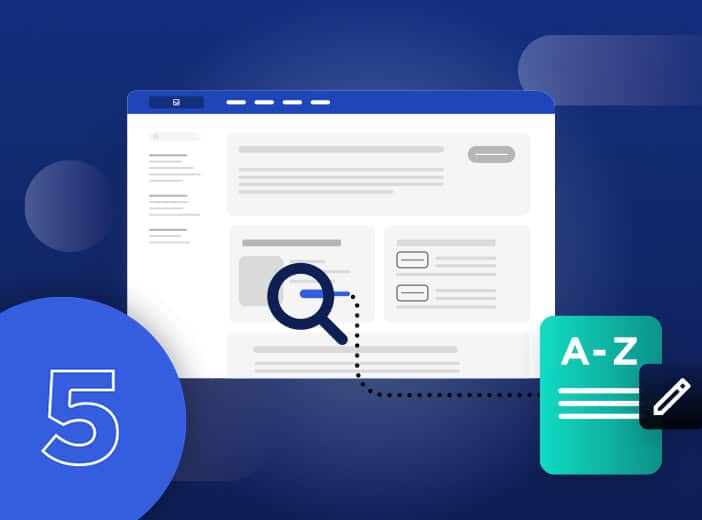6 predictions for better data management in 2023
What will 2023 bring for those of us working in the world of data? What are the key trends people need to be aware of? We’ve collected the opinions and predictions of a range of experts, including Forrester, Gartner, Microsoft and McKinsey, and have shared them below in our blog.

Despite economic headwinds, analysts and consultants agree that 2023 will bring greater innovation and investment around data sharing. That’s because organizations recognize the benefits that harnessing and distributing data internally and externally deliver.
But where should companies focus their data efforts and investments? To help we’ve researched in-depth predictions from across the market, distilling them in this blog and focusing on six key areas.
1. Putting the right data foundations in place
Forrester predicts that 60% of companies will increase their investment in their business intelligence and data infrastructures. A large proportion of these resources need to be targeted towards building strong data foundations that are based around making data easily shareable and available to users. That means moving away from centralized data lakes to more focused, flexible architectures.
In terms of architectures, experts expect 2023 to see further growth in use of data mesh approaches. In his key trends piece on Forbes Microsoft’s Suresh Sethuramaswamy points out that data mesh is invaluable for organizations looking to treat data as an asset and democratize access to information.
For those interested in data mesh, our CTO David Thoumas explains why it is essential to data democratization in this blog post.
2. Companies will increase end-to-end governance and observability of their data
Data will only be used if it is trusted to be high-quality, accurate and up-to-date. It also needs to be available as quickly as possible across the organization, allowing faster, real-time decision making. This is driving the growth of end-to-end governance and applied observability. Forrester’s Kim Herrington expects governance teams to grow as, “more organizations now understand that governance is the bedrock upon which data, advanced analytics, and artificial intelligence all sit.” McKinsey partner Holger Harreis stresses that without good data, good AI is not possible. Essentially, companies need to put the right data governance in place if they are to scale data use across the organization and beyond.
In its data trends report, Gartner highlights the importance of applied observability – using data to drive actions and optimization as quickly as possible through trusted, up-to-date information. This requires organizations to reduce latency as much as possible, while still ensuring data is high-quality and trustworthy. Gartner believes that by 2026, 70% of organizations that have successfully implemented applied observability will gain a competitive advantage.
We asked expert Nicola Askham for her best practice tips on creating an effective data governance strategy – read our blog to find out more.
3. Demand for internal and external data portals will accelerate
With more and more data being created, the demand for access to it inside organizations and from external partners is increasing exponentially. This is vital for business competitiveness, as Dinesh Nirmal of IBM explains, “Everyone in their organization — from sales to marketing to HR to operations — needs access to data to make better decisions.” It cannot solely be left in the hands of data specialists. Effective sharing means bringing data sources together and making them available through easy-to-use self-service sharing portals that empower everyone through data.
At the same time organizations will find it easier to share data externally with partners in their ecosystems, according to Deloitte, thanks to cloud-native data warehouses and data insights platforms. This all makes data more liquid and enables it to flow between organizations, creating new use cases.
The real challenge is to find and deploy a solution that will allow the entire team to effectively manipulate data and make it available for sharing – learn more about how our data experience platform enables this in our recent blog.
4. Data as a Service platforms will drive new revenues
Allied to the rise of external data sharing, organizations will increasingly be able to monetize their data through Data as a Service platforms according to Microsoft. By sharing their information, models and insights they can deepen collaboration and unlock new revenues.
What is critical to success is ensuring that these Data as a Service platforms:
- Are intuitive and straightforward to access
- Contain high-quality, up-to-date information
- Provide insights that deliver real value, based on the needs of customers
- Can scale to cope with potential demand from hundreds of users, delivering a tailored experience to all
- Ensure that all data is compliant and secure and any intellectual property is protected
Microsoft points to the rise of distributed data clean rooms to ensure compliance and security. These enable companies to anonymize and encrypt their data before sharing, delivering the benefits of Data as a Service collaboration while managing privacy and regulatory compliance.
A good example of this is smart water solutions provider Birdz by Veolia, which is transforming Internet of Things data into high value-added insights through its Data as a Service offering, adding value to its customers through data sharing.
5. Data cultures will expand cross-functional teams
Many organizations have started to build data-centric cultures, where all employees have access to the data they need to do their jobs, along with the skills, tools, and confidence to exploit it fully. Data cultures break down silos between different departments and drive greater collaboration, openness and transparency. This can be a complex process in some companies that have traditional hierarchies in place, and requires a combination of cultural change, communication and education.
As data is brought together to create data products for internal and external consumption, EY Americas believes that companies will increasingly build cross-functional teams to manage these products. Team members will have skills that span IT and business departments (such as finance, HR and operations), as well as data science specialists. Altogether they will be able to create relevant, targeted data products that deliver competitive advantage.
For tips on how to successfully implement a data culture, take a look at our in-depth blog post.
6. Sustainability data will move to the forefront
A final trend highlighted by Suresh Sethuramaswamy of Microsoft is the rise in the need to collect and share sustainability and corporate social responsibility (CSR) data. This may be generated by company operations or collected from supply chain partners, such as Scope 3 emissions data.
This information then has to be shared with a range of stakeholders, including investors, customers, consumers, and regulators through data portals and apps. It has to be clear and understandable and show progress against targets in a vivid, compelling way that appeals to non-specialists. Environmental, social and governance (ESG) factors are increasingly important when it comes to consumer engagement and investment decisions, meaning these portals, and the data behind them, has to be comprehensive, trustworthy and up-to-date.
Demonstrating the possibilities that sustainability data provides, luxury group Kering measures and quantifies the environmental impacts of all its operations. This includes CO² emissions, water consumption, air and water pollution, land use, and waste generation throughout the supply chain. It makes this data available through a variety of channels including as data stories, via an open data portal, and a mobile app.
All of these trends demonstrate the growing importance of data democratization to business success in 2023. They show how internal and external data sharing is crucial to ensuring competitiveness, efficiency, collaboration and creating new revenue opportunities. Organizations that can put in place the right framework, processes and people will therefore be able to out-perform their rivals, during this year and beyond.



